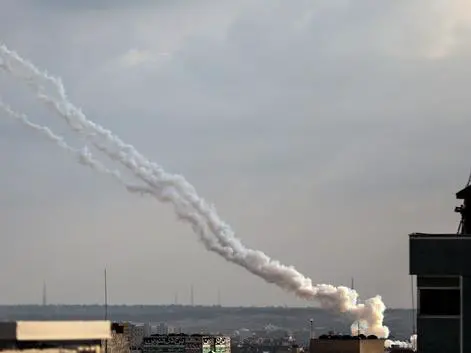Islamic Hamas movement is not interested in being involved in any military escalation with Israel, especially in light of indirect talks with Israel to reach a long-term truce, according to Palestinian observers on Monday.
The observers told Xinhua in separate statements that the exchange of fire between Israel and Islamic Jihad movement on Sunday evening didn't include any response from Hamas.
They added that Hamas and Israel have been trying to reach truce as soon as possible, despite the opposition in their communities.
Earlier on Sunday, the Israeli army killed Mohammed Naem, 27 years old, a member of the Islamic Jihad movement, in eastern Gaza Strip near the borders with Israel.
In response, Islamic Jihad fired more than 23 rockets into Israeli cities, while Israeli warplanes raided on military sites belonging to the Islamic Jihad movement.
Israel kept Hamas out of confrontation, said the Palestinian analyst Talal Okal, adding it's Israel's attempt to differentiate between the two strongest armed factions in Gaza.
Okal said Hamas appears to have different political goals from Islamic Jihad, as "it is seeking to reach a long-term truce agreement with Israel, so it refuses to escalate the situation with Israel."
Egypt, Qatar and UN have been mediating for more than a year to introduce humanitarian facilities into Gaza and prevent military confrontation between Palestinian factions and Israel.
However, Okal believes that Hamas cannot wholly control the situation in the Gaza Strip, especially as it is not the only dominant player on the ground.
"Islamic Jihad possesses a great military force too, which cannot be underestimated," he said, adding that this contributes significantly to undermining any calm agreements shortly.
The Gaza Strip will not witness stability in the near future even if Hamas seeks to achieve this, Okal said, adding that Israel seeks all the time to implement its political plans serving its interests.
For his part, Hamas spokesman Hazem Qassem believes that his movement is striving to compel Israel to implement the terms of indirect understandings by lifting the siege on the Gaza Strip.
"We know that Israel does not differentiate in its crimes among the Palestinians in the Gaza Strip, and all of us are on the same boat," he said.
He pointed out that Hamas will do its best to push Israel to lift the siege on the Gaza Strip, even if it will be forced to escalate the situation in Gaza.
Israel imposed a tight blockade on the Gaza Strip right after the Hamas movement violently seized control of the enclave and routed the security forces of Palestinian President Mahmoud Abbas in 2007.
Mohammed Hijazi, a Gaza-based political expert, believes that both Hamas and Israel will reach a long-term truce in the Gaza Strip.
The Israeli people are demanding to end the firing rockets from the Gaza Strip into their towns and achieve the stability, Hijazi said, adding that Hamas also needs to finish the Israeli blockade against it.
He added that the internal conditions in Israel and Gaza Strip push the two sides to reach the long-term truce, even though Islamic Jihad refuses this option.
Hijazi added that the option of calm is still dominating the scene due to political and economic considerations of both Hamas and Israel.
(by Sanaa Kamal)
 简体中文
简体中文





